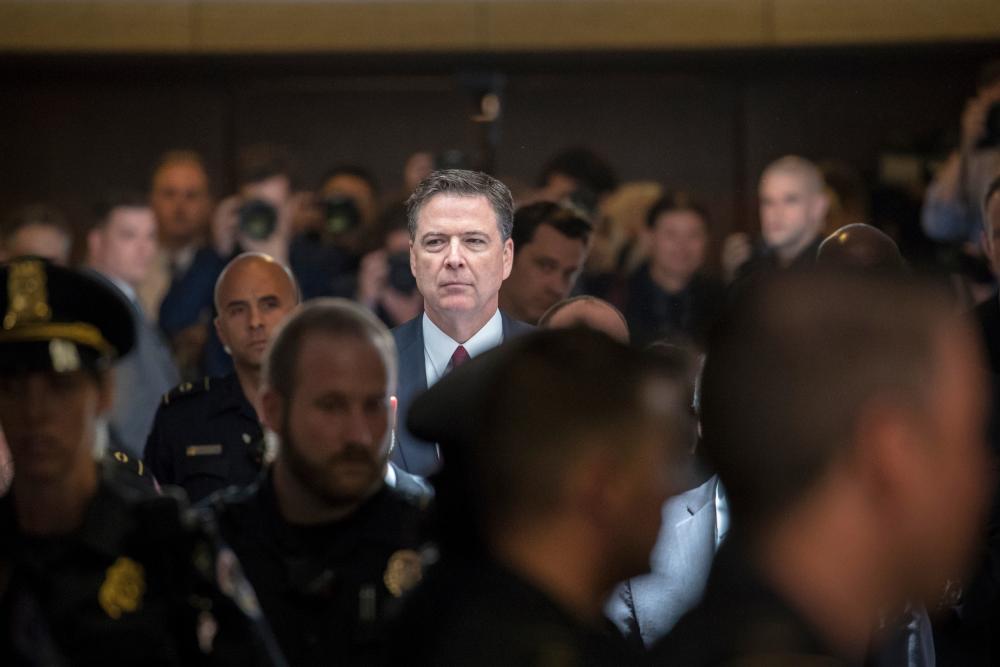Donald Trump’s long public campaign to get someone in his administration to bring criminal charges against James Comey, the former FBI director he fired in 2017, finally succeeded on Thursday, but the president has been so public about his loathing of the indicted man, and his desire to see him jailed, that it might be hard for prosecutors to convince a jury that the case was not brought for political reasons.
Comey was fired by Trump in 2017 after he reportedly refused a request to pledge his loyalty to the newly elected president, and then publicly confirmed to Congress that the FBI was conducting a counterintelligence investigation of Russian efforts to help Trump get elected in 2016.
Related: Ex-FBI director James Comey indicted on two charges as Trump pushes to prosecute political enemies
Trump’s firing of Comey backfired, however, because it helped convince then deputy attorney general Rod Rosenstein to appoint a special counsel, former FBI director Robert Mueller, to, in his words, “oversee the previously confirmed FBI investigation of Russian government efforts to influence the 2016 presidential election and related matters”.
Although Mueller’s report, issued in 2019, concluded that his team “did not establish that members of the Trump campaign conspired or coordinated with the Russian government in its election interference activities”, the investigation unearthed evidence that a Russian effort did take place and, in Mueller’s words, “established that the Russian government perceived it would benefit from a Trump presidency and worked to secure that outcome”.
Mueller added that the Trump campaign “expected it would benefit electorally from information stolen and released through Russian efforts”.
Mueller declined to charge Trump’s son, Donald Trump Jr, with violating campaign finance laws by soliciting information about Hillary Clinton from the Russian government in a meeting with a Russian lawyer in Trump Tower during the 2016 campaign, although the investigation made it plain that the Trump campaign had been open to help from Russia.
When a publicist for the Russian oligarch who paid Trump to stage his Miss Universe pageant in Moscow in 2013 wrote to tell Don Jr that a Russian prosecutor wanted to offer the Trump campaign “official documents and information that would incriminate Hillary and her dealings with Russia”, calling it “part of Russia and its government’s support to Mr Trump”, Trump’s son replied, “If it’s what you say, I love it,” and got Trump’s campaign chair Paul Manafort and Trump’s son-in-law Jared Kushner to attend the meeting.
The indictment of Comey comes as Trump seeks to use the power of the justice department to punish a man he sees as a central figure in the Russia investigation he has continually described as “a witch-hunt” and “a hoax”.
One of the ironies of the situation is that Comey, who cast himself as a rigidly non-partisan law enforcement official, played an outsized role in helping Trump to get elected in the first place.
It was Comey who, as FBI director in the summer of 2016, decided not to recommend criminal charges against Hillary Clinton over her use of a private email server to conduct official business while secretary of state, but took it upon himself to hold a press conference to explain his decision.
In that public forum, Comey said that while Clinton and her staff had been “extremely careless in their handling of very sensitive, highly classified information” and there was “evidence of potential violations of the statutes regarding the handling of classified information”, he had concluded, as a former prosecutor, that “no reasonable prosecutor would bring such a case”.
That news conference offered Trump, then running against Clinton, ammunition to describe her use of a personal email server as reckless. Trump embraced that line of attack, particularly after WikiLeaks published emails from Clinton campaign aides that had been stolen by Russian government hackers.
Then, days before the November election, Comey suddenly announced that the FBI had reopened its investigation of Clinton’s own emails, after copies of some mail was found on the laptop of the disgraced former congressman Anthony Weiner, who was then married to Clinton’s aide Huma Abedin.
Although Comey announced, before election day, that the review of the additional emails had found nothing of substance, Clinton dropped in the polls in the closing days of the campaign, and narrowly lost to Trump.
Another irony is that Comey, who has now been indicted by the new US attorney for the eastern district of Virginia, is himself a former federal prosecutor in that office, who went on to serve as the US attorney for the southern district of New York, and deputy attorney general under George W Bush before later being appointed FBI director by Barack Obama in 2013.

